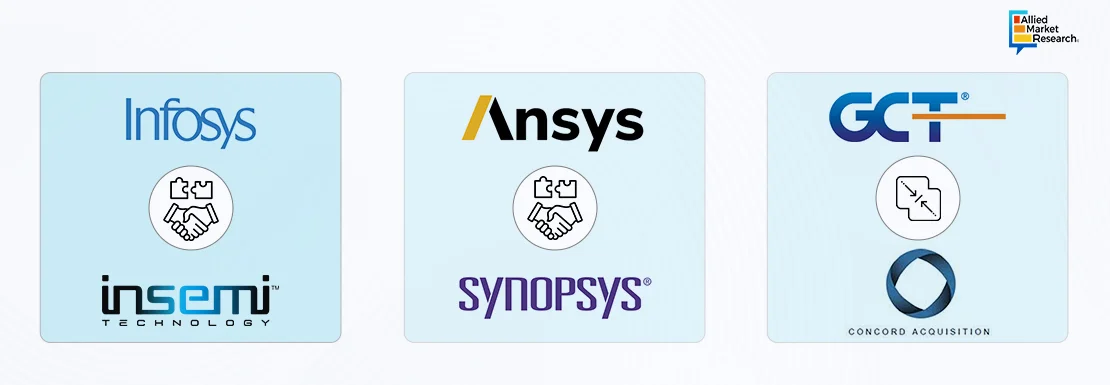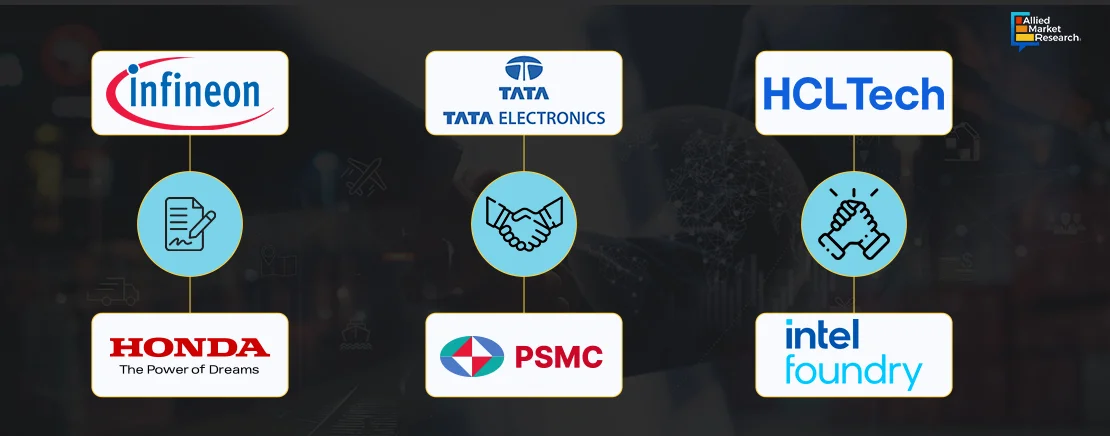Table Of Contents
- Prominent mergers and acquisitions pioneering the future of the sector
- Innovations and partnerships upgrading product portfolio
- Product and service launches strengthen the position of top entities
- Technological advancements changed the outlook of the industry
- Other developments optimizing the growth of the semiconductor and electronics domain
- Dynamic performance of the semiconductor and electronics sector in Q1 2024

Onkar Sumant

Koyel Ghosh
Semiconductor and Electronics Industry Outlook Q1 2024: Exploring the Contribution of M&A, Innovations, and Product Launches

The semiconductor and electronics sector is experiencing rapid growth fueled by rising demands across various applications, technological advancements, and the vital role of semiconductors in national security. Major companies in the industry are heavily investing in research and development, scaling up production capacities, and establishing collaborations with prominent technology firms. These investments enhance both revenue and earnings by improving their substantial impact on the global economy.
Prominent mergers and acquisitions pioneering the future of the sector
Many leading companies in the industry are choosing to engage in different agreements with their competitors in the industry. The first quarter of 2024 has witnessed industry leaders signing merger agreements with other firms, demonstrating their commitment to expanding operations within the sector.

In January 2024, Infosys revealed its plans to acquire InSemi, a company renowned for its expertise in semiconductor design and embedded services, for an undisclosed amount. The acquisition was estimated to be concluded in the same quarter and is expected to strengthen Infosys' capabilities in engineering research and development (R&D). This development is significant due to the essential role of semiconductors in advanced technologies like artificial intelligence (AI), 5G, quantum technology, the Internet of Things (IoT), and smart devices. This acquisition will open new avenues for Infosys in the 5G chipset industry and artificial intelligence chip sector.
Again, in January 2024, Ansys and Synopsys officially announced their agreement, whereby Synopsys will acquire Ansys. This strategic move will merge Ansys' extensive simulation and analysis portfolio with Synopsys' advanced semiconductor electronic design automation (EDA) abilities, forming a dominant force in comprehensive silicon-to-systems design solutions.
In March 2024, GCT Semiconductor successfully finalized its business combination with Concord Acquisition III. GCT is a designer and provider of advanced IoT, 5G, and LTE semiconductor solutions. GCT's shares and warrants are now listed on the NYSE under the ticker symbols GCTSW and GCTS. The transaction has valued GCT at an enterprise value of approximately $461 million. The merger is expected to offer promising growth opportunities to both organizations in the semiconductor domain.
Innovations and partnerships upgrading product portfolio
Innovations and partnerships play a crucial role in upgrading the semiconductor and electronics domain, driving growth and technological advancements. These factors are essential for staying competitive in the rapidly evolving industry landscape.

In February 2024, Infineon Technologies AG announced a significant development: the signing of a Memorandum of Understanding (MoU) between Infineon and Honda Motor Co., Ltd. This marks the beginning of a strategic collaboration between the two entities. Honda has chosen Infineon as its semiconductor partner to ensure the alignment of future products and technology roadmaps in the automotive semiconductor domain. Infineon will provide Honda with advanced technologies to empower the development of competitive and advanced vehicles.
Again, in February 2024, as a significant move toward establishing a domestic semiconductor ecosystem under the "Make in India, For the World" initiative, the Indian Government granted Tata Electronics' proposal to construct a massive semiconductor fabrication facility ("Fab") in Dholera, Gujarat, in collaboration with PSMC. The upcoming semiconductor Fab will specialize in manufacturing chips for various applications including power management IC, display drivers, microcontrollers (MCU), and high-performance computing logic. With this announcement, Tata Electronics is projected to debut in the global automotive computing chips industry.
Furthermore, in February 2024, HCLTech announced its partnership with Intel Foundry to develop personalized silicon solutions for semiconductor manufacturers, system OEMs, and cloud service providers to improve semiconductor foundry services. The objective of this collaboration is to address the growing global demand for semiconductor manufacturing by catering to clients' diverse silicon needs. It aims to achieve this by delivering a robust and inclusive ecosystem for semiconductor sourcing, ensuring that clients have access to a comprehensive range of solutions.
Product and service launches strengthen the position of top entities
The semiconductor and electronics industry's growth is propelled by the launch of new products and services, as well as investments in R&D activities and innovations in semiconductor technology and manufacturing processes. These factors are pivotal in driving industry expansion and promoting the development of advanced and innovative products and services.
In February 2024, Intel Corp. (INTC) introduced Intel Foundry, a sustainable systems foundry business designed for the AI era. Additionally, Intel revealed an extended process roadmap aimed at securing leadership well into the latter part of this decade. Furthermore, the company emphasized customer momentum and underscored support from ecosystem partners such as Synopsys, Cadence, Siemens, and Ansys. This product launch will assist Intel to thrive in the dynamic industry for semiconductor foundry.

Also, in February 2024, Sivers Semiconductors AB revealed the commercial debut of its advanced, cost-effective RF (Radio Frequency) Module BFM02803. This module provides coverage for the 5G FR2 mm Wave bands N261, N258, and N257, ranging from 24.25-29.5 GHz. This launch is a significant move for Sivers Semiconductor to maintain its supremacy in the 5G mmWave technology domain.
Again, in February 2024, Vervesemi, a fabless semiconductor company based in Noida, announced the launch of its Made-in-India Semiconductor Application-Specific Integrated Circuit (ASIC). The company stated that this accomplishment signifies a major milestone in India's path toward establishing itself as a global leader in semiconductor innovation and manufacturing.
Technological advancements changed the outlook of the industry
In February 2024, Finwave Semiconductor, Inc. presented its latest technological advancements and product offerings at MWC Barcelona. The company planned to reveal the latest performance standards achieved through its GaN-on-Si technology and high-power switches, which cater to the infrastructure and handset markets. Visitors witnessed live demonstrations at Finwave's designated meeting room (Hall 2, Booth 2D12MR) located at Fira Gran Via in Barcelona from February 26 to 29.
In March 2024, Hitachi Energy made a significant advancement in its power semiconductor technology with the introduction of the 300 mm semiconductor wafer. This innovative development enhances chip production capacity and facilitates the creation of more complex structures in 1200V insulated gate bipolar transistors (IGBT), a crucial power semiconductor device utilized for rapidly switching power supplies in high-power applications.

In March 2024, a collaborative research team, including Professor Jihwan An and PhD candidate Sung Eun Jo from the Department of Mechanical Engineering at Pohang University of Science and Technology (POSTECH), along with other members, achieved the successful production of porous electrodes for SOFCs (Solid Oxide Fuel Cells) using advanced semiconductor processes. This groundbreaking research has been highlighted as a back cover article in Small Methods.
Other developments optimizing the growth of the semiconductor and electronics domain
In February 2024, the White House highlighted the U.S. government's commitment to allocate $11 billion toward semiconductor-related research and development. Additionally, it announced the launch of the $5 billion National Semiconductor Technology Center. This investment will open new avenues for the top entities in the U.S. machine learning chip industry.
Besides, in February 2024, Applied Materials, a leading provider of chip equipment from the United States, made substantial efforts to accelerate the commercial readiness of semiconductor companies in India. According to Suraj Rengarajan, Managing Director of Applied Materials India, the company is focused on accelerating the commercialization process and promoting a robust semiconductor ecosystem. This move will strengthen the presence of Applied Materials in the memory chip sector and chip resistor domain.
In March 2024, the Union Cabinet sanctioned three chip-related projects valued at around Rs 1.26 lakh crore. Among these projects is the potential establishment of India's maiden semiconductor fabrication plant, a venture led by the Tata Group in partnership with a Taiwanese technology collaborator. The second project is also headed by Tata Group which will additionally establish a chip assembly plant in Morigaon, Assam, with an investment of Rs 27,000 crore. This facility will mainly serve the automobile market's requirements. The Cabinet also granted a third proposal by CG Power to establish a chip packaging facility in Gujarat's Sanand. In collaboration with Japan's Renesas Electronics, the company will set up the plant, with an estimated cost of Rs 7,600 crore.
Dynamic performance of the semiconductor and electronics sector in Q1 2024
The semiconductor and electronics sector has experienced notable growth owing to the rising demand for semiconductors across diverse industries, advancements in artificial intelligence (AI) and machine learning technologies, as well as the trend toward regional production and self-sufficiency. To meet the increasing demand for efficient semiconductor solutions, prominent companies within the industry have forged advantageous alliances through acquisitions, partnerships, and collaborations. They have also played a proactive role in supporting technological advancements and innovations, which have propelled the sector to a promising start in 2024.
For detailed insights into the semiconductor and electronics industry, feel free to contact our experts!

